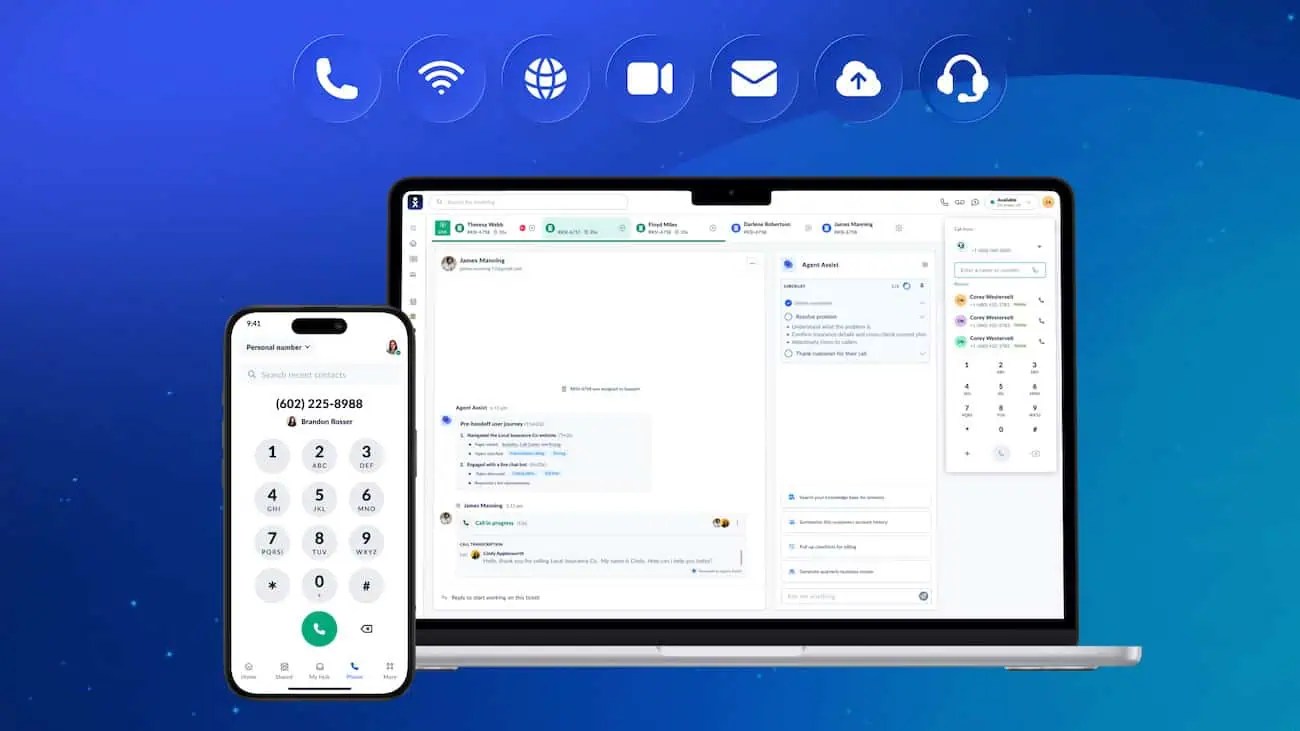As a small business owner, you can’t afford a communication system that keeps letting you down. If you’re still relying on plain old telephone services (POTS), you may face several challenges. High costs, poor call quality, and missed calls can hinder your ability to meet the demands of today’s fast-paced work environment.
Our research on Voice over Internet Protocol (VoIP) trends shows that nearly 40% of companies have remote teams. As new work models take over, the need for a reliable and flexible system is greater than ever. Online phone services provide a cost-effective and scalable solution to keep your business connected wherever you go.
How do internet-connected phones enable seamless communication across work locations and devices? Let’s take a closer look at how these phones work and explore the benefits they can offer your small business.
What Is an Online Phone Service?
An online phone service operates over the internet rather than using copper wire-based POTS or mobile networks. This technology requires an internet connection, a VoIP phone or app, and a subscription to an online phone service provider. The more stable and high-speed your internet connection, the better the quality of your VoIP system.
Online phone services are software-based, enabling you to make calls from any location and on any device as long as you have an internet connection. Your smartphone can become your mobile work desk once you’ve installed your VoIP provider’s app.
This mobile-first approach opens the door for small businesses to scale. You can generate leads, onboard, and manage new clients without purchasing new phone hardware or enduring complex installations.

Online Phone Services vs. Traditional Landlines
Although POTS are becoming obsolete, landline phones are still valuable in areas with limited internet infrastructure. But due to their wider range of features, VoIP phone systems are gaining the upper hand over landlines. To help you future-proof your business communications, we have compared VoIP with landline phone systems in seven key areas.
| Feature | Online phone service | Traditional landline |
|---|---|---|
| Infrastructure | Cloud-based (no hardware needed) | Requires physical copper lines and a private branch exchange (PBX) |
| Flexibility | Use on any device, anywhere | Tied to physical locations |
| Cost | Typically lower monthly costs and no long-distance charges | High setup and maintenance costs |
| Scalability | Easily add or remove users | Requires physical line installation |
| Features | Call routing, voicemail, SMS, CRM, AI and video | Basic calling and voicemail |
| Activation time | Minutes to hours | Days or weeks with carrier coordination |
| Call quality | HD voice (dependent on the internet connection) | Consistent but static |
1. Infrastructure
Traditional landline architecture relies on copper wires, and your voice travels as an electrical signal. It requires the installation of physical wiring and a PBX to connect to a local phone service. The PBX manages the routing of inbound and outbound calls.
In contrast, there is no complex setup involved in online phone services. They only require the right app or software and devices that connect to the internet.
2. Flexibility
Traditional desk phones allow calls only within their installed locations. Meanwhile, cloud-based systems store and manage transmitted data on remote servers, allowing users to access information from numerous devices.
3. Cost
Physical line installation can be expensive, and so are the monthly service charges. Rates may vary based on location (higher charges for overseas calls) and additional features, such as call waiting and voicemail. Maintenance and repair can be expensive and time-consuming.
Meanwhile, VoIP offers core features at no extra charge. Many services offer monthly plans with unlimited or a set number of minutes for international calls. Moreover, providers can perform product updates remotely.
Our VoIP costs study shows that telecom bills can decline by up to 60% with online phone systems. Tabarka Studio partnered with Nextiva to end its landline phone frustrations. The terra cotta tiles manufacturer saved money while enjoying features such as routing and toll-free numbers.

4. Scalability
You pay extra and spend additional time on physical installation when adding new lines to traditional phone systems. Downscaling can be tricky, as you may be stuck with unused lines or equipment. Meanwhile, VoIP providers can easily add or remove lines through administrative changes, removing the need for installing or acquiring additional physical devices.
5. Features
Basic landline services offer limited functionality besides voice calling. The integration of these services with modern business workflows, such as call logging and mobile support, is also minimal. Some advanced features may incur additional charges.
VoIP leverages internet connectivity and digital processing to provide voice-to-text transcription, advanced routing, and auto-attendant systems. Online phone systems also typically include detailed reporting on call volumes, customer satisfaction metrics, and cost analysis.
Furthermore, the capability to sync with customer relationship or project management platforms and other tools creates seamless workflows that reduce communication friction.
Nextiva’s AI features have also helped clients achieve a 35% reduction in manual call transfers. How? AI-driven settings automate routing and chatbot replies, providing solutions without delay.
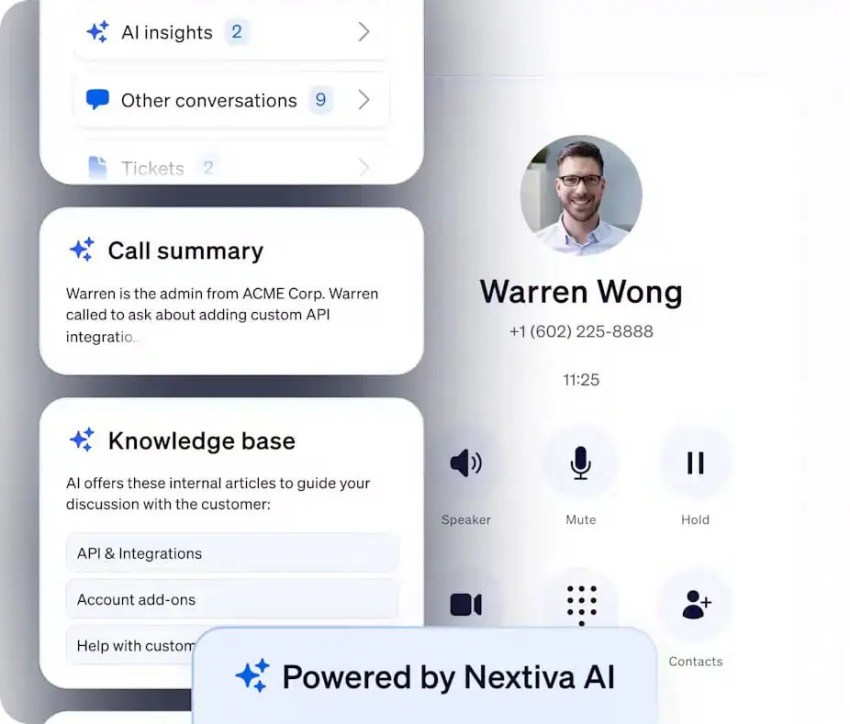
6. Activation time
Activating a traditional landline service can take days or even weeks. Several factors affect the waiting time, such as the phone company’s procedures, the technical team’s availability, and the physical installation. Meanwhile, activation time for VoIP can be as short as minutes, requiring only account setup and configuration settings.
7. Call quality
Voice clarity on landline phones can decline over long distances due to signal loss. Because VoIP leverages the internet, it can deliver clear, high-definition sound over any distance. However, a stable and strong internet connection is necessary for optimal call quality.
VoIP relies on electrical power, so outages can disrupt services. Providers address this by forwarding calls to mobile devices.
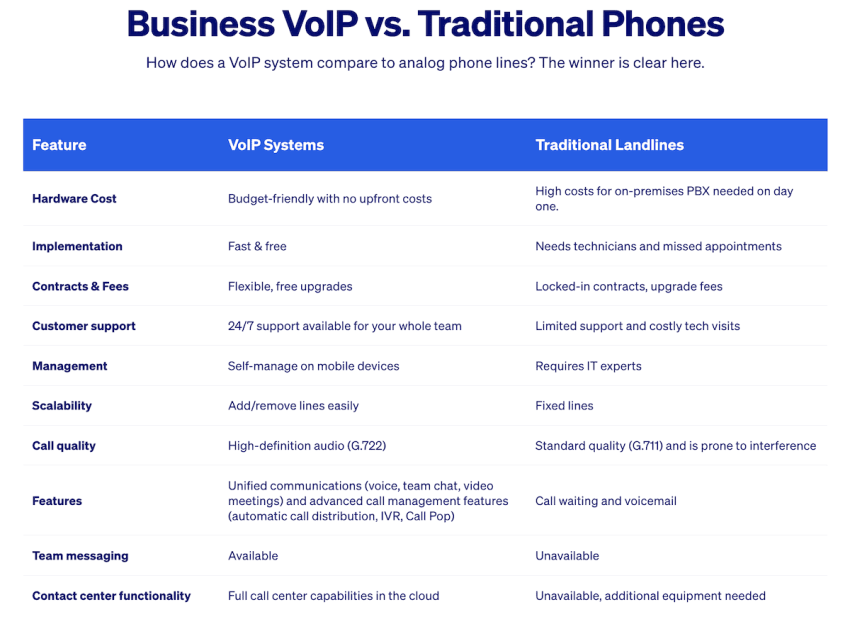
Must-Have Online Phone Service Features
When searching for an online service, choose a provider that offers features that enhance business efficiency. The right tools can simplify your interactions with clients and improve team collaboration across devices.
Here are eight must-have features to look for:
Unlimited calling and texting
Choose a provider that offers unlimited VoIP calls (local and long-distance) and texting. This will allow your team to communicate with clients freely without worrying about unexpected charges.
Call forwarding and call flip
Call forwarding ensures that customers can still get support after business hours or when your staff members are otherwise engaged. Meanwhile, the call flip feature allows you to shift conversations from one device to another. This offers a seamless experience, as the call isn’t cut off during this switch.
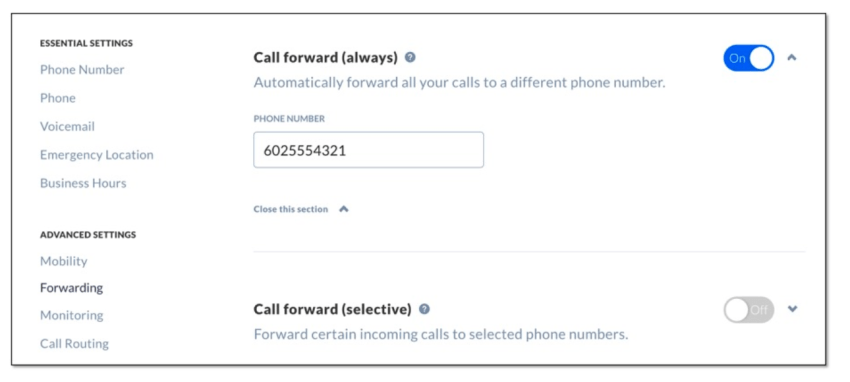
Voicemail to email and transcription
Automatically transcribe voicemail to text to quickly identify urgent to-dos without listening to long recordings. The audio-to-email conversion makes it easy to prioritize and respond to urgent calls quickly.
Business phone numbers
VoIP providers can offer you options to choose a local, toll-free, or vanity business phone number. They also enable number porting (transferring your current number) from a traditional provider to the VoIP service.
Designating specific phone lines for each department is also easy with VoIP. Having a dedicated number for sales or client support enhances your professional image and cuts waiting times.
Mobile apps (iOS and Android)
Make calls, send text messages, and access voicemails on the go. Mobile apps let you manage everything using your business number instead of your personal mobile phone number.

Call routing and auto attendant/interactive voice response (IVR)
With call routing, customers reach the correct department instantly. Meanwhile, auto attendants and IVR give callers easy, self-help options, reducing delays and transfers. Look for a service company that allows you to set custom flows with time-based and skill-based routing.
CRM and tool integrations
Sync your VoIP with platforms like Salesforce and HubSpot to automatically capture customer data. This way, agents can personalize their responses in real time and reduce manual entry.
Analytics and reporting
These features allow you to track and analyze call data to evaluate agent performance and identify trends. Call analytics cover call volume, average call duration, wait times, and missed phone calls. Reports can also provide insights into conversion rates to determine the most effective marketing channels.
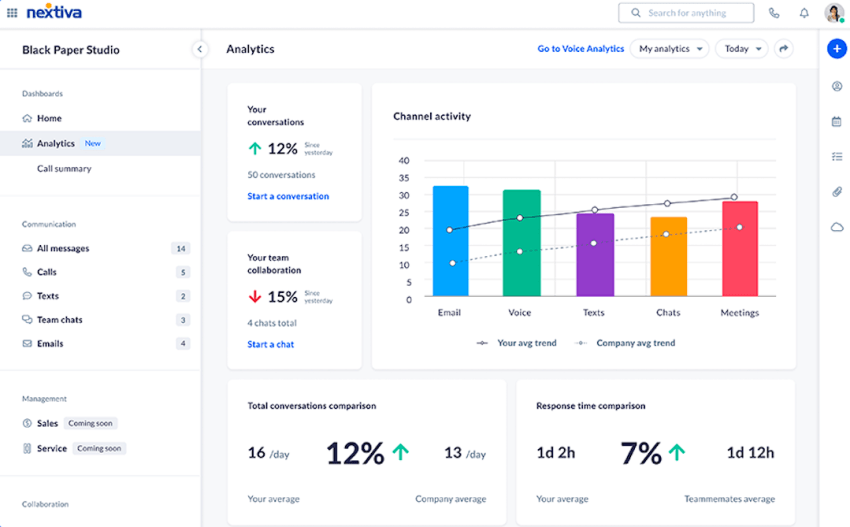
Online Phone Service Advantages
VoIP services bring powerful advantages that can support your business as it evolves. From affordable pricing to effortless expansion, they provide everything you need to stay connected.
Lower monthly bills
Online phone services help you save costs because they involve no hardware setup. You can sign up for a plan that suits your budget and business needs.
Remote-friendly
Because many VoIP solutions integrate with mobile and desktop apps, your business phone system can travel with you. You can maintain a professional image and stay accessible to clients without being tied to a desk.
Flexible pricing
Most providers offer different pricing tiers with varying monthly and annual options. Some companies even have pay-as-you-go or pay-per-use billing. This helps when your business experiences fluctuating call volumes or you want to test a provider’s performance and call features before committing to them long term.
Rich functionality
A cloud-based phone system provides unified communication by integrating video conferencing, SMS, email, and live chat into a single platform. A single subscription can streamline internal and external interactions.
This accessibility was what Canopy Technology was looking for. Nextiva’s contact center solution empowered its outreach strategy, an impossible feat if the fintech firm had stuck with its legacy systems.
Scalable
Introducing and removing extensions is fairly easy with VoIP systems. Moreover, you can achieve the agility you need to operate a remote or hybrid workforce and find the best talent anywhere in the world.
Business continuity
Online phone services make customer support available even during disasters or power outages. Call forwarding, voicemail, and conference calling through mobile apps make this possible. Meanwhile, features like file sharing and instant messaging help sustain team collaboration among remote workers.
Better customer insights
Analytics and reporting features provide valuable data to enhance decision-making when it comes to optimizing customer operations, streamlining workflows, and improving overall satisfaction.
Enhanced security
VoIP providers protect your data from unauthorized access through encryption, strong authentication methods, and secure network protocols. To prevent fraud, companies conduct real-time monitoring and use techniques such as behavioral biometrics or interaction analysis. Providers deploy security updates regularly to counter evolving threats.
These providers also follow relevant privacy standards, such as HIPAA or GDPR. These regulations set requirements for data storage, call recording, and user activity tracking.
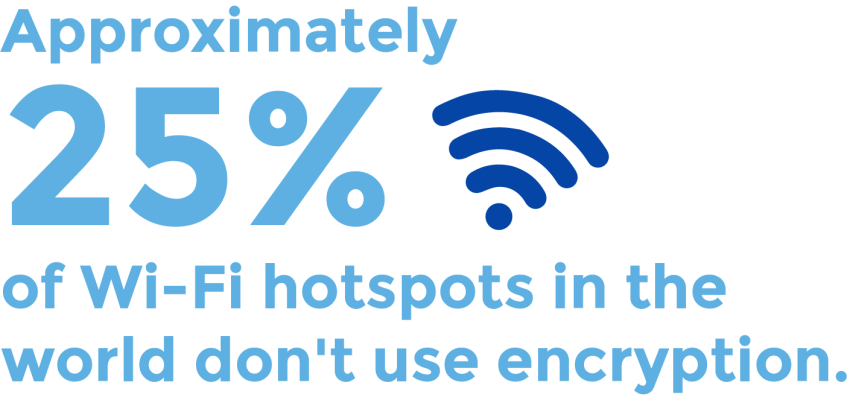
Integration with other software
Online phone systems become a natural extension of your operations, as they can integrate with your business platforms. Integrating your phone system with existing workflows enhances efficiency because users don’t need to switch between tools. Integrations also reduce manual customer data entry, saving time and improving interactions with clients.
Environment-friendly
VoIP systems have less environmental impact than landline systems because the former leverage existing internet infrastructure. Fewer physical components require less manufacturing and transportation, which can reduce air pollution.
Many VoIP phones incorporate power-saving features. Additionally, a dispersed remote team eases pollution because team members don’t have to commute to work.
Top 5 Online Phone Service Providers in 2025
To help you select the best VoIP solution, here’s a look at the top five providers in 2025. These companies stand out because of their innovative and scalable features, which keep your business connected and enhance efficiency.
1. Nextiva

Nextiva is an all-in-one VoIP solution that excels at offering unified communications. It allows you to access voice, video, email, and SMS communications in one easy platform. Users can access their dashboard through desktop units or their smartphones.
Key features:
- Comprehensive integrations: Includes one-click calling from popular CRMs for a unified view of customer data during incoming calls.
- Advanced features: Offers features like call analytics, voicemail transcription, and automated attendants.
- Number porting: Has the ability to transfer your business phone numbers to Nextiva for free. Your business also gets a toll-free number.
- Scalable pricing: Offers flexible plans that grow with your business, starting with low-cost options for small businesses.
Pricing: Starts at $15/month (when billed annually or $23 when billed monthly), which is ideal for small and mid-sized businesses
2. RingCentral
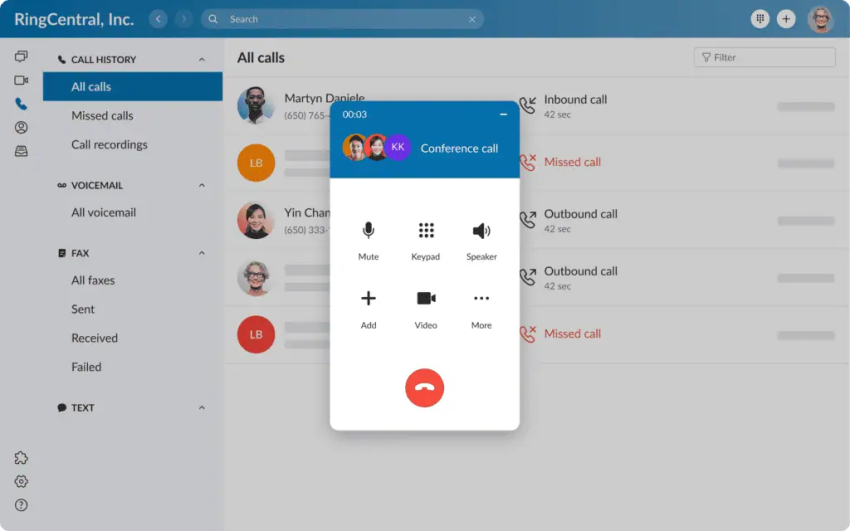
RingCentral is another powerful Unified Communications as a Service or UCaaS platform. Its focus on integrations and customizability makes it ideal for larger businesses with complex needs.
Key features:
- Extensive integrations: Connects with third-party tools and offers open APIs that can sync with your home-grown app.
- Advanced analytics: Offers insights into business performance, with easy-to-read call data, advanced analytics (over 30 KPIs), and call management features.
Nextiva surpasses RingCentral in video conferencing participants (150 more people per meeting) and toll-free minutes (1,000 more minutes on the Engage plan than on RingCentral’s equivalent plan).
Pricing: Starts at $20/month (when billed annually or $30 when billed monthly), with CRM integrations available on a higher plan
3. Zoom Phone
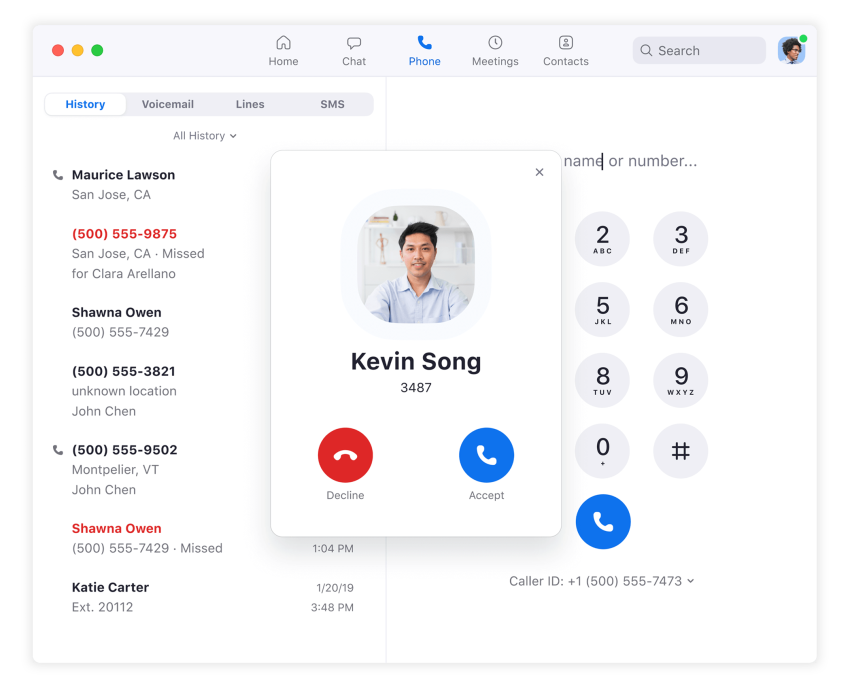
Zoom Phone is a convenient option for businesses already using Zoom for virtual meetings. The videoconferencing leader has harnessed AI to provide additional functionality.
Key features:
- Post-call summaries
- Voicemail prioritization
- Voicemail task extraction
- Team SMS threads overview
Zoom Phone has pay-as-you-go and unlimited phone plans (for calls in the US and Canada). However, it offers limited integrations with CRM systems and lacks advanced routing options compared to Nextiva.
Pricing: Starts at $15/month in the US and Canada for phone-only plans. Workplace Pro + phone is $18.33/month (when billed annually or $21.99 when billed monthly), making it a budget-friendly solution for small teams.
4. Dialpad

Dialpad prides itself on being an AI-powered tool with a hybrid cloud architecture. This structure blends the public cloud’s scalable powers with the private cloud’s capability to store sensitive data.
AI-driven key features:
- Real-time, searchable call transcription and post-call summaries
- Live coaching
- Real-time agent assistants
- Sentiment analysis and sales playbooks
- Predictive CSAT
Dialpad’s AI features focus on enhancing agent performance and call efficiency. Nextiva’s AI tech stack is more effective at enhancing the customer experience due to its omnichannel scope. Its dashboard lets you view each customer’s profile across all digital touchpoints. You can also gather feedback from any channel using Nextiva’s pre-built survey templates.
Pricing: Starts at $15/month (when billed annually or $27 when billed monthly), with CRM integrations available on a higher plan
5. Vonage
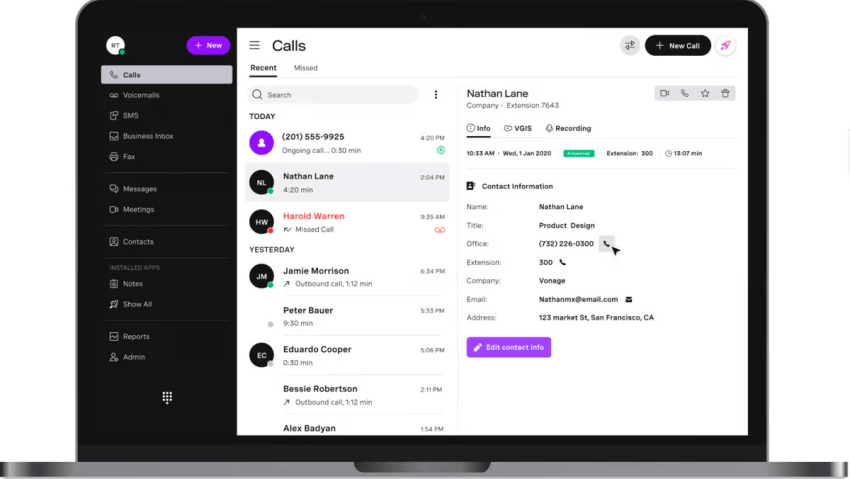
Vonage is known for its voice APIs, which are resources your developers can use to build in-house applications with voice-based functionality. This platform is an excellent choice if you need customizable voice bots for global expansion. It offers virtual phone numbers in over 80 countries.
Key features:
- Customizable APIs: Includes customizable IVR and voice APIs (120 languages with automatic speech recognition)
- Integrations: Syncs with CRMs, contact centers, and conversational commerce platforms
Pricing: Vonage’s pricing starts at $19/month, with videoconferencing, chat, and CRM integrations available on a higher plan
Nextiva: The Best Online Phone Service for Your Business
Now that you know what to look for in a phone service, it’s time to select the right provider for your business. Consider these questions to guide your decision:
- Do I need mobile apps for a hybrid team?
- Is CRM integration or call analytics a priority?
- Am I scaling quickly? Do I need a solution that grows with my company?
- Do I simply need better call quality and a lower monthly bill?
Nextiva offers tailored solutions for businesses at different growth stages. It’s an affordable, user-friendly system for startups. Meanwhile, mid-sized or expanding companies can benefit from its scalability, robust analytics, and feature-rich offerings.
Take the next step today: Let Nextiva equip you with collaboration and customer-facing tools that grow with you. Book a consultation with us to get ahead of the competition.
Simple, Transparent Pricing
Deliver amazing experiences with the #1 platform for experience management across all customer interaction channels.

















 VoIP
VoIP 

